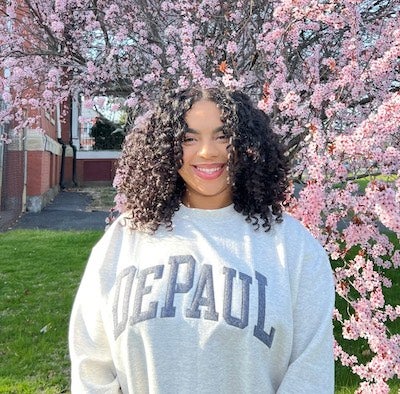Majors: Africana Studies, Sociology, and Writing & Rhetoric
Hometown: Providence, RI
Q. What makes the College of Arts and Sciences at URI unique?
A. What I find to be the most unique thing about the College of Arts and Sciences is its richness in diversity and offering a range of interesting studies. From the classics, like history and English to the more specified programs of gender and women’s studies and Africana studies. There’s a place for everyone here.
What accomplishments and/or activities at URI are you most proud of now?Receiving the 2021 Academic Excellence Award in Africana Studies is one accomplishment I am most proud of. I’ve learned that theory without any practice of it has no greater purpose if not applied and as an AAF major, I learned how to apply my knowledge outside of the classroom and make a larger contribution through my education. Being a part of the e-board for the Black Student Union has also played a part in my time here. As the organization’s Community Service Chairwomen, it’s allowed me to meet and connect with other organizations outside of URI that serve the Black community like we do and be useful towards my future working within my community.
What research projects, internships, experiential learning, and/or study abroad programs did you participate in at URI?
Last year, I worked under Dean Earl Smith III (Assistant Dean of the College of Arts and Sciences) on Rhode Island’s History and Social Studies Advisory Committee. We worked together among several other Rhode Island school board members on brainstorming what could be added or changed to the Providence School’s social studies curriculum that could better reflect the underrepresented student population. I was able to provide input regarding the need for more black, LGBTQ, and Latin history to be taught, and helped me gain more experience in working in a collaborative setting. This last semester of mine, I am also working on an independent study project with Professor Julie Keller of the Sociology department on W.E.B. Dubois and his influence as a sociologist on international social movements. I find this as a great way to close off my undergrad, as Dubois was my main reason for becoming a sociology major. Working closely alongside my professors allowed me to expand my academic interests in many different ways. Learning from their years of knowledge and wisdom is most memorable about my time here.
What do you value about your liberal arts education?
I think the greatest thing about studying the liberal arts is its capability of allowing students to think outside of their own world and progressively on the worlds that are yet to come from the minds of our future generations. It opens the window of intellectual thought wider for us to explore and learn about the fields that play a large contributing factor to our education and society. Studying the liberal arts, I was able to open my mind to new ideas and new ways of thinking, which is what learning is all about.
What have been some highlights of your time in the Sociology, Africana Studies, and Writing & Rhetoric departments? How did you come to triple major?
I think one of my favorite things I find in each department is the support and personability of its staff and professors. I was able to create relationships with my advisors and mentors throughout the years that all helped me succeed as a newcoming writer, historian, and researcher.
When picking my majors, I was reminded to myself that I have always been someone who has loved the arts. Reading and writing play a large part in who I am outside of the classroom and I knew I still wanted to do what I loved in an academic setting, to make something out of my many passions. After a few Sociology courses, I knew the major was for me since it mixed social life with research and had a bit of everything I enjoyed. Africana studies was my second added major from the love I have for black literature and history. As a poet, adding Writing and Rhetoric as my third major came naturally, and have all been my path since sophomore year.
What’s next for you?
I will be attending law school this fall of 2022. It was a push to apply to law school straight out of undergrad and as a triple major, but possible and I find the journey of a student to be never ending in a way. I hope to work as a diverse attorney in both intellectual property law and human rights law. After graduating this spring, I want to spend my last bit of time enjoying Rhode Island before I move to a different city and start this new chapter in my life. A lot later, I hope to return to graduate school again and receive my Ph.D. in Africana Studies or Sociology.
Anything else you’d like to share?
I’d like to thank professors James Haile, Catherine Camara, Earl Smith, Julie Keller, Emmet Goods, Barry O’Connor, Vanessa Quainoo, Earline Ferguson, Alana Bibeau, Norman Barber, Luanne Roth and Jerroid Avant for their teachings and influence on me as a student.

